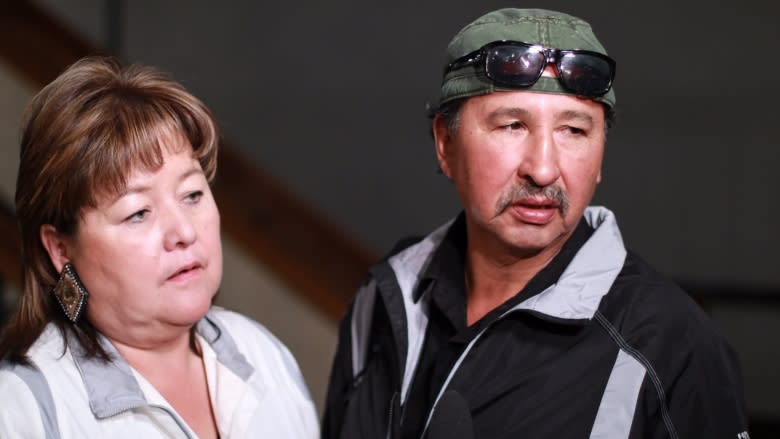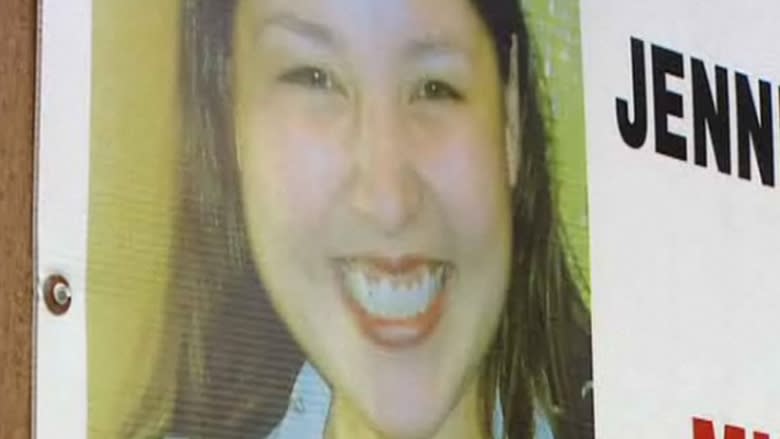'They're cutting our time short,' Catcheways' MMIWG testimony delayed, cut back
The parents of Jennifer Catcheway insist they will not be silenced.
Bernice and Wilfred Catcheway's testimony in Winnipeg was postponed Monday night, after they received a phone call from a lawyer for the National Inquiry into Missing and Murdered Indigenous Women and Girls.
"The reason they didn't want us to testify is that they didn't want us to jeopardize the case," said Bernice.
The family was supposed to testify Tuesday, a time slot arranged by inquiry staff. They said they have been waiting nine years for the chance to put Jennifer's story on the public record. Bernice said the couple have been vocal since their daughter disappeared, and she can't understand why they can't speak now.
"They said you could speak, but privately; I said no," she said.
In an emailed statement, commission lawyer Christa Big Canoe said she couldn't release information on specific conversations with families or survivors because of confidentiality.
"The family was explained that there are different options and opportunities on how to share their stories as part of the truth gathering process, but that in some circumstances they're not able to share in the public," she wrote. "The legal team needs to take the opportunity to assess each case."
The Catcheways said they're now scheduled to participate on Friday, but it will be in a sharing circle with eight to 10 families — not one-on-one with a commissioner.
Bernice said they will now have 20 minutes to share, not the two hours they would have originally had on Tuesday.
"They're cutting our time short, you can't limit what we've been waiting for for nine years," she said. "It's very poorly, poorly run."
Testimony critical of format, salaries
Alaya McIvor did not hold back in her testimony at the national inquiry.
McIvor spoke for her cousin, Roberta McIvor, who was decapitated on the Sandy Bay First Nation in 2011.
"I don't believe in this [inquiry]. I am sitting here because of my auntie," said McIvor. "When my auntie died, she believed in a national inquiry."
McIvor's aunt, Cindy Rubio, Roberta's mother, died from cancer in 2016.
The inquiry heard Roberta hired a designated driver the night she was killed. Two teen girls pleaded guilty to manslaughter after the 32-year-old was pushed from the back seat with her neck tangled in the seatbelt and dragged until she died.
McIvor said she once believed in a national inquiry and walked across Canada in 2013 calling for one. What she and other families envisioned isn't what she sees now, she said.
"You guys really failed us. You really failed drastically," she told commissioner Michelle Audette in the public hearing.
"Family needs a strong voice," Audette said about McIvor's criticism. "That's what she is. That is her right and so I have to respect her position."
McIvor, who is also a human trafficking survivor, presented Audette with 36 recommendations.
She was also critical of the inquiry's spending and questioned why all of the commissioners weren't present in Winnipeg.
"Where are those other three commissioners … that head commissioner who is making $270,000 off the back of our loved ones," she said.
Chief commissioner Marion Buller's salary range is $230,800 to $271,500, according to an order-in-council.
Buller will be in Winnipeg on Wednesday. She was previously scheduled to speak at a conference in Alberta.
Audette said that from here on, hearings will only have one or two commissioners present.
"If we were the four of us all together, it would be the ideal, but because of the time we have we don't have much time. We have a huge country to travel across, so we have to share," she said.




